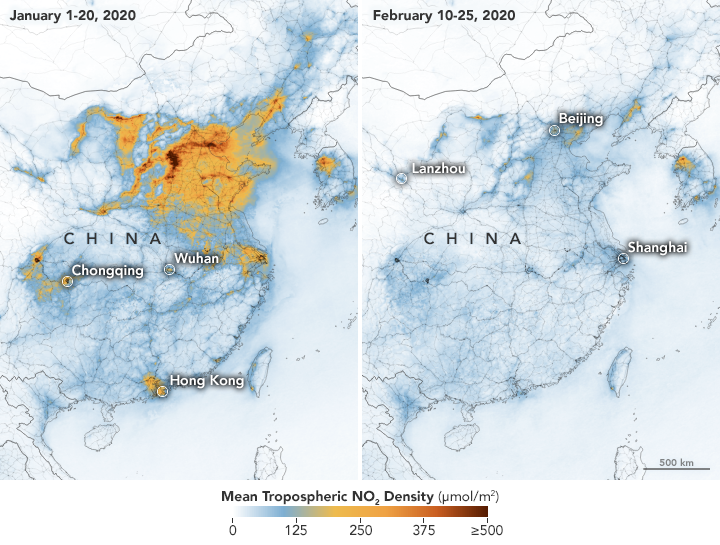Coronavirus Update: Air Pollution Over China Reducing Due To Industrial Shut Down

KEY POINTS
- Air pollution has dropped in China since the virus outbreak has reduced industrial activity.
- Beijing once had among the worst air pollution in the world
- The amount of nitrogen dioxide over China has greatly declined
The coronavirus epidemic has produced at least one beneficial impact – it has led to a dramatic reduction in air pollution in China.
The National Aeronautics and Space Administration the and European Space Agency reported that their pollution monitoring satellites found significant reductions in the amount of nitrogen dioxide – a gaseous air pollutant caused by the burning of fossil fuels such as coal, oil, gas or diesel – in Chinese skies.
“There is evidence that the change is at least partly related to the economic slowdown following the outbreak of coronavirus,” NASA said.
Since Jan. 23, when Chinese authorities began to shut down transport links in and out of Wuhan, the epicenter of the virus, the country has also ordered various quarantines affecting tens of millions of people as well as the temporary closure of an untold number of factories.
These measures, among others, have greatly reduced the amount of nitrogen dioxide over China. The decline was initially noted in and around Wuhan, but has since encompassed nearly all of the vast country.
“This is the first time I have seen such a dramatic drop-off over such a wide area for a specific event,” said Fei Liu, an air quality researcher at NASA’s Goddard Space Flight Center.
Liu remembered witnessing a drop in nitrogen dioxide over various countries during the financial crisis of 2008, but then the reductions were gradual.
“There is always this general slowdown [in Chinese industrial activity] around this time of the year,” said Barry Lefer, an air quality scientist at NASA. “Our long-term [ozone monitoring instrument] data allows us to see if these amounts are abnormal and why.”
In 2020, nitrogen dioxide readings were 10% to 30% lower in eastern and central China compared to prior years.
“This year, the reduction rate is more significant than in past years and it has lasted longer,” Liu added. “I am not surprised because many cities nationwide have taken measures to minimize spread of the virus.”
The Chinese capital of Beijing has long had some of the worst pollution in the world, largely due to China’s dependence on coal burning.
However, ironically, Beijing has actually reduced its pollution levels since 2013 when the situation reached a crisis point. Since that time, the average concentration of PM2.5 – harmful atmospheric particulate matter with a diameter of less than 2.5 micrometers – has been cut by 53% from Beijing skies.
The United Nations praised Beijing’s efforts to reduce its air pollution.
Joyce Msuya, the deputy executive director of the UN’s environment program, wrote that “no other city or region on the planet has achieved such a feat,” which itself was the result of “an enormous investment of time, resources and political will.”
Ma Jun, director of the Beijing-based non-governmental organization, the Institute of Public and Environmental Affairs, said Beijing improved its air quality through tighter controls on coal combustion, vehicle emission controls and the use of cleaner fuels, among other measures.
Beijing municipal authorities have shut down all coal-fired plants and asked residents to cease using coal-fired boilers in favor of natural gas and electricity in winter.
Between 2005 and 2018, the amount of coal burned in Beijing has plunged from 30 million tons to 4 million. In tandem, the concentration of sulfur dioxide in the atmosphere plummeted by 85% from 28 micrograms per cubic meter in 2013 to 4 micrograms per cubic meter in 2019.
For China as a whole, the national average concentration of PM2.5 amounted 39 micrograms per cubic meter in 2018, a 9.3% drop from the prior year.
As China uses less coal, natural gas and renewables are both gaining their portions of the nation’s energy mix.
“A direct outcome of clamping down on coal and accelerating the country’s post-industrial transition has been a remarkable decrease in air pollution, a leading priority of the Xi [Jinping] administration,” wrote Damien Ma, Director of the Think Tank at the Paulson Institute.
© Copyright IBTimes 2024. All rights reserved.





















